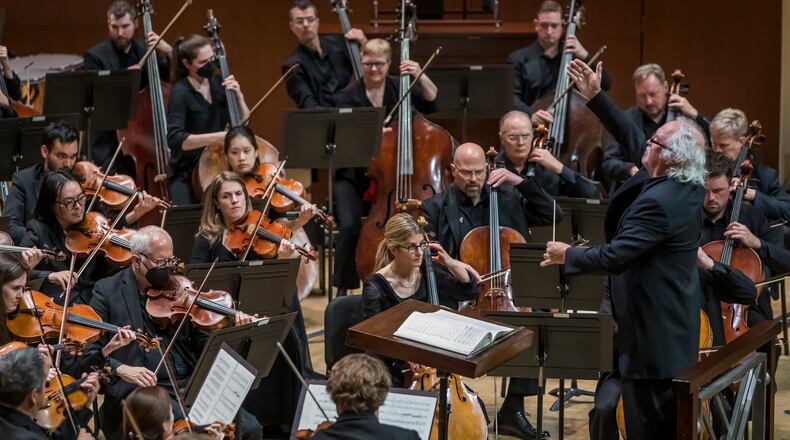Donald Runnicles, principal guest conductor of the Atlanta Symphony Orchestra, was more than a decade into his tenure with the orchestra when he last led them in Maurice Durufle’s “Requiem.”
It was the most recent time the ensemble performed the sacred piece, which feels tailor-made for a church setting. (Norman Mackenzie, ASO’s director of choruses, programmed the work more recently at Trinity Presbyterian Church, where he serves as music director.)
Another decade on, Runnicles is preparing to end his time with the orchestra by looking back at the awe-inspiring Durufle work. The conductor’s final appearances with the ASO Chorus won’t occur until his next season in Atlanta — he offers up the Brahms-penned “A German Requiem”, in January 2023 — but Runnicles has been associated with Atlanta for so long that he deserves something of a long goodbye.
For Thursday night’s expertly crafted program, Runnicles led the orchestra in two Debussy works — ”Prelude to the Afternoon of a Faun” and the engaging “Nocturnes”— before the main choral event. In “Nocturnes,” the string section created a robust, opulent ensemble blend that both felt ethereal yet tactile at once. The gauzy clouds of sound supported slithering woodwind melodies.
In March, the chorus performed Mozart’s “Requiem,” led by incoming music director Nathalie Stutzmann. Durufle’s setting for the requiem mass, composed 150 years later in a musical world that Mozart would hardly recognize, is so dissimilar as to make comparisons useless — and the chorus likewise had a vastly different sound in this performance.
For the symphony musicians, Durufle’s orchestration contains intricate, delicately constructed string parts that are unique when taken one at a time but together gently push forward the “Requiem” with a cohesive, organ-like sound. The expansive orchestra rarely got close to overpowering the full ASO Chorus, which was at its most powerful in the quieter movements of a contemplative “Requiem.” The Durufle is a world away from the fiery, aggressive Mozart, but no less passionate.
I’ve written before that the ASO Chorus is most impressive in the low dynamic range, when the energy and force of their sound is focused into a delicate but deliberate pianissimo. Durufle’s “Requiem” is full of those instances, and it is in these spots that the chorus once again fully came alive. On the other end of the dynamic spectrum is where the chorus sometimes had problems. In the “Sanctus,” the collected voices sang out with triple-forte gusto that should have been reigned in a bit.
For all the beauty of the choral movements, the “Pie Jesu,” a solo for mezzo-soprano, turned out to be the most gratifying. Soloist Jennifer Johnson Cano’s performance Thursday was one of those instances where I almost sensed mouths dropping open in amazement. Her voice seemed to hold the packed house still for four and a half minutes. Baritone Douglas Williams was likewise impressive, singing beautifully with a forceful vigor.
The world outside the hall still casts a shadow over performances within, and health and safety was certainly on my mind Thursday. Before the concert, one of the chorus members tested positive for COVID-19, necessitating extra mitigation efforts developed by the ASO in concert with Dr. Carlos del Rio and Dr. Susan Ray, who have been guiding the ASO during the entire pandemic. They, and the entire Atlanta arts community, have done tireless work to bring performances safely back to the stage. While the pandemic put a pause on the celebratory goodbye for former music director Robert Spano, here’s hoping Runnicles’ final tour proceeds as planned.
CONCERT REVIEW
Atlanta Symphony Orchestra
Additional performance 8 p.m. April 30. $23-$110. Symphony Hall, 1280 Peachtree St. NE, Atlanta. 404-733-5000, atlantasymphony.org.
About the Author
Keep Reading
The Latest
Featured


